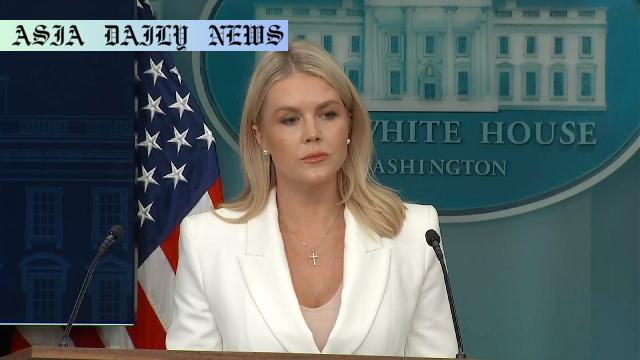Tariff Deadline: White House suggests the current 90-day tariff pause could be extended depending on productive trade discussions.

The Current Landscape: Understanding the 90-Day Tariff Pause
The focal point of global economic discussions recently has been the 90-day pause on reciprocal tariffs initiated under U.S. President Donald Trump’s administration. This tariff pause was set as a buffer period to encourage negotiations and elicit fairer trade practices from the United States’ trading partners. With the July 9 deadline fast approaching, discussions are intensifying around the possibility of extending this deadline. The announcement from White House Press Secretary Karoline Leavitt has further ignited speculation. The statement highlighted that while the deadline “could be extended,” such a decision ultimately rests with President Trump. Such developments shed light on the delicate balance between diplomacy, global economic growth, and the U.S.’s drive to secure fair trade agreements.
Diplomacy in Progress: Productive Global Trade Talks
Throughout this process, U.S. officials, led by Treasury Secretary Scott Bessent, have been deeply engaged in pursuing solutions with global trading partners. According to the White House, the talks have borne fruit, with concrete discussions ushering in more cooperative understandings between the U.S. and its key trade allies. Cooperation is at the forefront of this initiative, as productive engagements are pivotal for reducing tariffs. This cooperative momentum, however, comes with its underlying firmness. Should any trading partner resist these discussions or fail to align with the U.S.’s terms, the Trump administration has made it clear that reciprocal tariffs will be reactivated. Such measures underscore the administration’s commitment to protecting American industries and labor from unfair practices.
Strategic Vision: Challenges and Opportunities at Stake
Extending the tariff deadline not only grants additional time for diplomatic efforts but also provides a significant opportunity for analyzing the global economic impact. The pause, designed to ease tensions and pave the way for constructive negotiations, has been instrumental for sectors most affected by tariffs. However, the challenges remain steep. Countries that fail to comply with fair trade practices may face economic backlash. At the same time, the flexibility to extend the deadline signals to the global community that the U.S. is prioritizing diplomacy over conflict. Such a decision, if taken, will require careful analysis of potential economic benefits and repercussions for both the U.S. and its partners.
The Broader Implications: U.S. Trade Policy Moving Forward
The potential extension of the tariff deadline could set a precedent in U.S. trade policy, reflecting a strategic blend of assertiveness and diplomacy. It demonstrates that while the U.S. is prepared to uphold its interests, it remains willing to collaborate with international partners to find amicable solutions. This dual approach is essential in ensuring the continued growth of a balanced global economy. More importantly, it establishes the foundation for sustained multilateral cooperation, a move that resonates with modern economic demands. As international trade remains a powerful driver of economic growth, maintaining constructive dialogues and adapting policies to evolving global dynamics is critical. The coming weeks will be pivotal in shaping the trajectory of global trade relationships, with the U.S. leading by action.
Commentary
The Significance of Diplomatic Patience
The suggestion to potentially extend the 90-day tariff pause marks a significant moment in the modern trade landscape. While tariffs are often contentious, the opportunity to halt and re-evaluate brings a rare chance for diplomacy to take center stage. The willingness of the U.S. administration to entertain these discussions reveals a tactile and pragmatic approach to international economics. In a globalized world where economies are interlocked, short-term decisions can often reverberate into long-term impacts. The U.S.’s readiness to consider an extension suggests an understanding that diplomacy, when employed wisely, can be as powerful as any tariff enforcement tool.
Balancing Fair Trade with Global Collaboration
The productive discussions highlighted by key U.S. figures, including Treasury Secretary Scott Bessent, create a hopeful outlook. However, balancing fair trade objectives with the reality of diplomatic complexities requires a fine touch. On one hand, the U.S. must safeguard its economic interests and ensure that domestic industries are not put at a disadvantage. On the other hand, efforts to build trust and foster collaboration with international partners are equally critical for economic prosperity. The ongoing tariff deliberations encapsulate this intricate balancing act. How both sides approach the table will set a standard not only for global trade but also for future diplomatic engagements.
Looking Ahead: A Critical Moment for Global Economics
Ultimately, the decision on whether to extend the tariff deadline remains in the hands of the U.S. President. While this decision will undoubtedly have immediate implications for trade, its broader significance cannot be understated. How the global community responds, how trust is cultivated, and how cooperation can be maximized will define the narrative going forward. The willingness to consider extensions or new timelines underlines the importance of flexibility in high-stakes negotiations. It’s a reminder that while tariffs may seek reciprocity, the ultimate goal lies in shared growth and mutually beneficial agreements.


